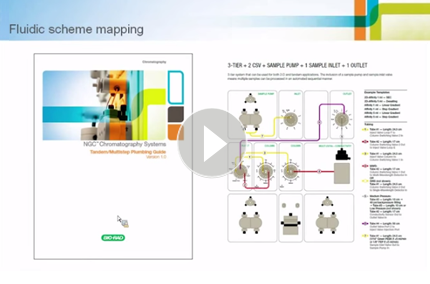June 24, 2014
Philip Chapman, MSc
Global Product Manager
Bio-Rad Protein Purification
Abstract:
Philip Chapman of Bio-Rad Laboratories discusses the advantages of automated multidimensional (Multi-D) chromatography compared to traditional multi-step purification strategies.
Topics covered include:
- Automating purification strategies
- Automating method optimization
- Multi-D method templates
- Case Study 1: Converting a 3-day, 4-column IMAC purification into a 5-hr Multi-D method
- Case Study 2: Automating a 4-column mAb purification
Bio-Rad's NGC™ Systems for preparative chromatography are designed to rapidly automate the purification of biomolecules. The flexible, modular, and economical design makes NGC Systems the instruments of choice for method development and scale-up. NGC Systems are available in preplumbed, factory-tested configurations with two different flow rates. Each preconfigured system can be further customized and upgraded by adding valves, detectors, or pumps to meet specific application needs, such as tandem/2-D and multidimensional chromatography.
Any system can be configured for operation at either high or low flow rate by simply changing the pump head on the system pump module. With the NGC System, a single hardware platform can be modified as needed to suit changing applications and scales.
About the speaker:
Philip Chapman joined Bio-Rad Laboratories as the technology expert for the SELDI-TOF-MS product line acquired from Ciphergen Biosystems Inc. After integrating this line into Bio-Rad's proteomics instrument product portfolio, he moved into a new role as global tactical applications lab manager, supporting both customers and internal sales and FAS teams with proteomics product training and application and novel protocol development. Philip moved into a global product manager role in 2011, responsible for the ProteOn™ XPR36 product line before moving to the Protein Purification Group in 2013, where his responsibility is to provide technical and commercial expertise for chromatography platforms.

